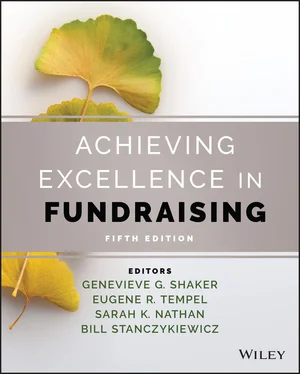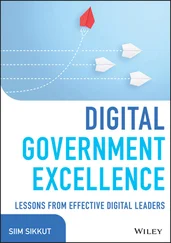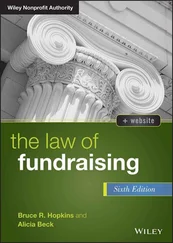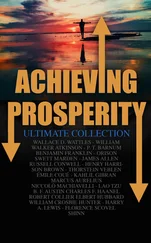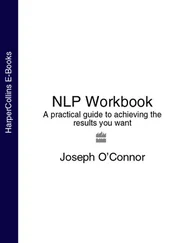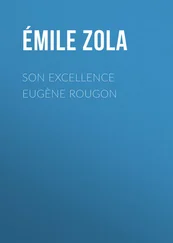Achieving Excellence in Fundraising
Здесь есть возможность читать онлайн «Achieving Excellence in Fundraising» — ознакомительный отрывок электронной книги совершенно бесплатно, а после прочтения отрывка купить полную версию. В некоторых случаях можно слушать аудио, скачать через торрент в формате fb2 и присутствует краткое содержание. Жанр: unrecognised, на английском языке. Описание произведения, (предисловие) а так же отзывы посетителей доступны на портале библиотеки ЛибКат.
- Название:Achieving Excellence in Fundraising
- Автор:
- Жанр:
- Год:неизвестен
- ISBN:нет данных
- Рейтинг книги:5 / 5. Голосов: 1
-
Избранное:Добавить в избранное
- Отзывы:
-
Ваша оценка:
- 100
- 1
- 2
- 3
- 4
- 5
Achieving Excellence in Fundraising: краткое содержание, описание и аннотация
Предлагаем к чтению аннотацию, описание, краткое содержание или предисловие (зависит от того, что написал сам автор книги «Achieving Excellence in Fundraising»). Если вы не нашли необходимую информацию о книге — напишите в комментариях, мы постараемся отыскать её.
Achieving Excellence in Fundraising
Achieving Excellence in Fundraising
Achieving Excellence in Fundraising
Achieving Excellence in Fundraising — читать онлайн ознакомительный отрывок
Ниже представлен текст книги, разбитый по страницам. Система сохранения места последней прочитанной страницы, позволяет с удобством читать онлайн бесплатно книгу «Achieving Excellence in Fundraising», без необходимости каждый раз заново искать на чём Вы остановились. Поставьте закладку, и сможете в любой момент перейти на страницу, на которой закончили чтение.
Интервал:
Закладка:
Tables
| Chapter reference | Title |
|---|---|
| 18.1 | The Evolution of Fundraising as an Organizational Function in the United States, 1900–2000 |
| 18.2 | Characteristics of Successful Fundraisers from Research |
| 19.1 | Management versus Leadership Activities |
| 19.5 | Effectiveness of Dimensions of Power for Fundraising Leaders |
| 22.3 | Example Annual Fund Gift Range Chart, $60,000 Goal |
| 24.1 | Levels of Organizational Engagement in Content Creation |
| 26.1 | Individual Donor Resources That Can Enable Charitable Giving |
| 29.1 | Overall Giving by Household's Race |
| 29.2 | Informal Giving Incidence by Household's Race |
| 31.2 | Giving Rates and Average Giving Amounts across Four Generational Cohorts |
| 32.1 | High Net Worth Household Charitable Giving by Sector (Overall Mean and Median) |
| 32.2 | High Net Worth Household Charitable Giving by Sector and Race/Ethnicity |
| 32.3 | High Net Worth Household Giving Vehicles |
| 32.4 | High Net Worth Household Motivations for Giving |
| 32.5 | High Net Worth Households' “Demotivations” for Giving (Why not Give?) |
| 33.3 | Essential Shifts from Transactional to Transformational Relationships |
| 35.4 | Potential Gift Range Chart for a $10 Million Campaign |
| 37.1 | Overview of DAF Sponsor Types |
| 38.1 | Foundation Types, Financing, and Requirements |
Figures
| Chapter reference | Title |
|---|---|
| 4.1 | Model of Identification Theory |
| 6.1 | Seven Roles of Philanthropy |
| 12.1 | The Fundraising Cycle |
| 12.2 | The Four‐Legged Stool of Fundraising |
| 12.3 | Donor Pyramid of Fundraising Strategies |
| 13.1 | Ad from Dana‐Farber Cancer Institute |
| 14.1 | Rosso Constituency Model |
| 14.2 | Wheel of Roles and Responsibilities |
| 14.3 | Wheel Example Family 1 |
| 14.4 | Wheel Example Family 2 |
| 16.1 | Brand Pyramid Indiana University Lilly Family School of Philanthropy |
| 19.4 | Four Roles of the Nonprofit – Including Fundraising – Leader |
| 20.1 | Eight‐Step Board Recruitment Process |
| 20.3 | Eight Stages of Board Retention |
| 21.1 | Six Steps for Successful Volunteer Fundraiser Involvement |
| 22.1 | Profile of the Annual Fund |
| 22.2 | Annual Fund Profile Shapes |
| 22.4 | Donor Retention Calculation and Example |
| 24.2 | Peer‐to‐Peer Fundraising |
| 24.3 | Percentage of Social Media Users in General Population, by Age |
| 26.2 | Eight Mechanisms That Drive Charitable Giving |
| 26.3 | Spiderplot of Mechanisms for Giving |
| 30.1 | Partial Pooling Financial Management |
| 31.1 | Generational Cohorts in Historical and Social Context |
| 33.1 | Intersection Where Major Gifts Occur |
| 33.2 | Transactional to Transformational Fundraising |
| 33.4 | The Eight‐Step Major Gift Management Cycle |
| 34.1 | A Process for Preparing, Formulating, and Making the Invitation to Give |
| 35.1 | Sample Campaign Progress Chart for a $10 Million Campaign |
| 35.2 | Phases of a Campaign |
Exhibits
| Chapter reference | Title |
|---|---|
| 2.1 | Proposed Beneficiary Bill of Rights |
| 15.1 | The Departmental Budget Worksheet |
| 15.2 | Fundraising Fitness Test Top Indicators Tab |
| 15.3 | Time Study Factor Worksheet, Part 1 |
| 15.4 | Time Study Factor Worksheet, Part 2 |
| 15.5 | Time Study Factor Worksheet, Part 3 |
| 15.6 | Fundraising Net Analyzer – MFE Calculating Fundraising Measures |
| 19.2 | Fundraising Plan Template |
| 19.3 | Sample Fundraising Timeline |
| 20.2 | Board Needs Matrix |
| 20.4 | Board Resource Development Commitment and Tracking Form |
| 35.3 | Campaign Readiness Test (adapted from Rosso 1991) |
FOREWORD
This book is a critical resource in a time when many institutions are struggling to demonstrate their relevance to rapidly changing social and economic conditions. This fifth edition of Achieving Excellence in Fundraising meets the challenge of responding to such concerns by combining rigorous research with the insights of exceptional practitioners. As lead editor of the prior three editions and intellectual successor to Hank Rosso, Dr. Gene Tempel is also welcoming a generational change with three new editors who bring fresh topics and perspectives to the endeavor. Tempel provides a valuable bridge from the founding vision of the publication to current and future practice. He has ensured that the book's enduring values continue to guide an engaging journey of discovery into what it means to excel in fundraising.
Professor Genevieve Shaker, the lead co‐editor, represents the next generation of leadership on the faculty of the Indiana University Lilly Family School of Philanthropy at IUPUI. Her research focuses on fundraising and fundraisers, philanthropy in higher education, philanthropy education, and the ways people give in the workplace, drawing also on two decades of experience as a practitioner in the field. Dr. Sarah Nathan leads a community foundation while continuing her passions for teaching and scholarship, following her curiosity about those who choose fundraising as their calling. She also draws on her experiences developing cutting‐edge academic curricula on fundraising as well as professional development programs for The Fund Raising School. For over six years, Professor Bill Stanczykiewicz has been leading The Fund Raising School to new levels of innovation and prominence while taking on additional responsibility for the Lilly Family School's fundraising and communications programs. As a faculty member he has strengthened the leadership and fundraising aspects of the academic curriculum, drawing on his research into board dynamics as well as many years of experience serving as chief executive of a youth‐focused nonprofit.
What our new editors share with Gene Tempel is an intimate immersion in the intellectual life of the Lilly Family School, as well as a deep commitment to engaging those who fundraise as a way to improve our world. Their collaboration reveals that running deep and strong across generations is a desire to show how the joy of discovery leads to success in the field, and that the worlds of research and doing continue to build on each other in pursuit of excellence. As the founding dean of the Lilly Family School and president emeritus of the Indiana University Foundation – as a scholar and fundraiser – Tempel sets a high standard for the new generation of editors in integrating theory with practice.
This book was produced during a global pandemic, the likes of which we have not faced in living memory. The pandemic also became the stage for social justice movements based on dramatic incidents calling attention to racial and gender inequity and injustice, vivid signs of systemic discrimination, and increased political polarization. All have intensely affected the institutions most dependent on philanthropy. In normal times, keeping abreast of research and evolving practice is taxing enough. Doing so during the pandemic required additional efforts – not only because of the very human challenges our editors and authors faced, but also because the nonprofit sector and those who seek to engage it experienced novel stresses and strains that shifted the ground we seek to understand.
Читать дальшеИнтервал:
Закладка:
Похожие книги на «Achieving Excellence in Fundraising»
Представляем Вашему вниманию похожие книги на «Achieving Excellence in Fundraising» списком для выбора. Мы отобрали схожую по названию и смыслу литературу в надежде предоставить читателям больше вариантов отыскать новые, интересные, ещё непрочитанные произведения.
Обсуждение, отзывы о книге «Achieving Excellence in Fundraising» и просто собственные мнения читателей. Оставьте ваши комментарии, напишите, что Вы думаете о произведении, его смысле или главных героях. Укажите что конкретно понравилось, а что нет, и почему Вы так считаете.
